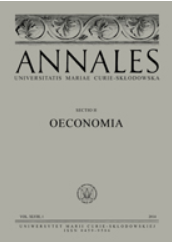Zombies or Still Alive. Who Took Advantage of COVID-19 State Aid?
Zombies or Still Alive. Who Took Advantage of COVID-19 State Aid?
Author(s): Tomasz Wiśniewski, Adam Adamczyk, Sławomir FranekSubject(s): Economy, Public Finances
Published by: Wydawnictwo Naukowe Uniwersytetu Marii Curie-Sklodowskiej
Keywords: public aid; COVID-19; financial performance
Summary/Abstract: Theoretical background: The SARS-CoV-2 pandemic has caused violent reactions from the governments of almost all countries in the world. The attempt to contain a pandemic by restricting the mobility of society has had a huge impact on people and some businesses. As a result of COVID-19 restrictions, it became necessary to introduce special state aid programs for those businesses that were most affected by these restrictions. This was also the case in Poland. We based our analysis on welfare economics (Harberger, 1971), in which government support for enterprises is legitimized when their situation would have been worse without these interventions.Purpose of the article: The aim of this article is to assess the impact of public aid granted to large companies in Poland on their financial condition. The research problem is to answer the question whether the companies that received the aid needed it. In assessing the appropriateness of aid, liquidity, debt level and profitability indices were used, which directly resulted from the objectives of COVID-19 aid granted in Poland. The added value of the study is combining the analysis of data from financial statements with information on state aid published by the Office of Competition and Consumer Protection (UOKiK).Research methods: The research sample consisted of 1,201 large Polish enterprises from the non-financial sector. The study used non-parametric statistical tests and quartile analysis.Main findings: The results show that the aid went to entities that were already in a worse financial situation before the pandemic. At the same time, it was demonstrated that the aid did not distort the market mechanism, i.e. it neither excessively improved the situation of supported entities nor significantly worsened the situation of entities that did not benefit from the aid.
Journal: Annales Universitatis Mariae Curie-Skłodowska, Sectio H Oeconomia
- Issue Year: LVI/2022
- Issue No: 2
- Page Range: 149-163
- Page Count: 15
- Language: English

